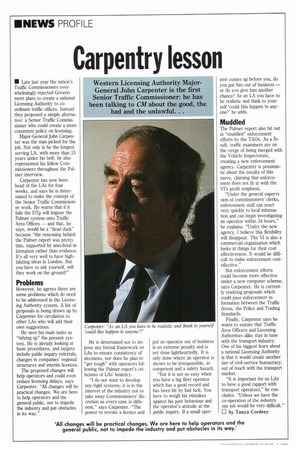Carpentry lesson
Page 12

If you've noticed an error in this article please click here to report it so we can fix it.
11 Western Licensing Authority Major, General John Carpenter is the first Senior Traffic Commissioner: he has 1)een talking to CM about the good, the bad and the unlawful. . . • Late last year the nation's Traffic Commissioners overwhelmingly rejected Government plans to create a national Licensing Authority to coordinate traffic offices. Instead they proposed a simple alternative: a Senior Traffic Commissioner who could create a more consistent policy on licensing.
Major-General John Carpenter was the man picked for the job. Not only is he the longest serving LA, with more than 15 years under his belt; he also represented his fellow Commissioners throughout the Palmer interview.
Carpenter has now been head of the LAs for four weeks, and says he is determined to make the concept of the Senior Traffic Commissioner work. He warns that if it fails the DTp will impose the Palmer system onto Traffic Area Offices — and that, he says, would be a "dead duck" because "the reasoning behind the Palmer report was pretty thin, supported by anecdotal information rather than evidence. It's all very well to have highfaluting ideas in London. But you have to ask yourself, will they work on the ground?"
Problems
However, he agrees there are some problems which do need to be addressed in the Licensing Authority system. A list of proposals is being drawn up by Carpenter for circulation to other LAs who will add their own suggestions.
He sees his main tasks as "tidying up" the present system. He is already looking at basic procedures, and targets include public inquiry referrals, changes in companies' regional structures and interim licences.
The proposed changes will help operators and could even reduce licensing delays, says Carpenter. "All changes will be practical changes. We are here to help operators and the general public, not to impede the industry and put obstacles in its way." He is determined not to impose any formal framework on LAs to ensure consistency of decisions, nor does he plan to "get tough" with operators following the Palmer report's criticisms of LAs' leniency.
"I do not want to develop any rigid systems; it is in the interest of the industry not to take away Commissioners' discretion as every case is different," says Carpenter. 'The power to revoke a licence and put an operator out of business is an extreme penalty and is not done lightheartedly. It is only done where an operator is shown to be irresponsible, incompetent and a safety hazard.
"But it is not so easy when you have a big fleet operator which has a good record and has been hit by bad luck. You have to weigh his mistakes against his past behaviour and the operator's attitude at the public inquiry. If a small oper ator comes up before you, do you put him out of business — or do you give him another chance? As an LA you have to be realistic and think to yourself 'could this happen to anyone?' he adds.
Muddled
The Palmer report also hit out at "muddled" enforcement efforts by the TA0s. As a suit, traffic traffic examiners are on the verge of being merged with the Vehicle Inspectorate, creating a new enforcement agency. Carpenter is pessimistic about the results of this move, claiming that enforcement does not fit in with the VI's profit emphasis.
"Under the general supervision of commissioners' clerks, enforcement staff can react very quickly to local information and can begin investigating an operator within 24 hours," he explains. "Under the new agency, I believe this flexibility will disappear. The VI is also a commercial organisation which looks at things for their cost effectiveness. It would be difficult to make enforcement costeffective."
But enforcement efforts could become more effective under a new computer scheme, says Carpenter. He is currently studying proposals which could pass enforcement information between the Traffic Areas, the Police and Trading Standards.
Finally, Carpenter says he wants to ensure that Traffic Area Officers and Licensing Authorities alike stay in tune with the transport industry. One of his biggest fears about a national Licensing Authority is that it would create another tier of civil-service bureacracy, out of touch with the transport market.
"It is important for us LAs to have a good rapport with transport operators," he concludes. "Unless we have the co-operation of the industry our job would be very difficult." o by Tanya Cordrey




















































































































































